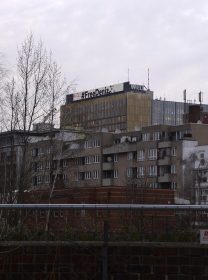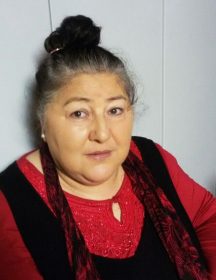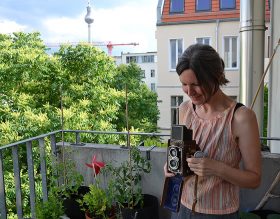
View from the Academy of the Jewish Museum Berlin towards the Springer building with the lit-up sign, #FreeDeniz; Jewish Museum Berlin, photo: Stefanie Haupt
As I leave my office at the Jewish Museum Berlin, emerging from the W. Michael Blumenthal Academy onto the street, the hashtag “#FreeDeniz” beams towards me from an illuminated black-on-turquoise-green display on the Axel Springer building. The first time I saw it, I was cheered by the signal that the publishing house Axel Springer SE* was calling for the release of Die Welt’s correspondent in Turkey, Deniz Yücel. But each day seeing the display has gotten sadder. I’ve known Deniz Yücel since 2003, when — together with other German- and Turkish-speaking Berliners — he organized bilingual protests against the bomb attacks on the two Istanbul synagogues, Neve Shalom and Beth Israel, on November 15 of that year. Twenty-four people were killed in those attacks and at least 300 wounded.
Deniz and I haven’t had contact for quite awhile. But since mid-February, through the news of his imprisonment for “terrorist propaganda” and the car procession protests that followed it, as well as conversations with friends and of course the illuminated sign, memories from the period in 2003 and 2004 when we interacted almost weekly having been coming back. → continue reading
Reading with Anita Awosusi

Anita Awosusi has championed Sinti and Roma civil rights; photo: private
Our series “New German histories” continues this year: on February 9, 2017, (the date was cancelled at short notice!) Anita Awosusi will introduce her book Vater Unser – Eine Sintifamilie erzählt (Our Father – A Sinti Family Recounts) in the W. Michael Blumenthal Academy of the Jewish Museum Berlin. In her book the author weaves together her family’s biography, broader historical events, and the aftermath of Nazi rule. She tells the story of her father and at once of her own evolution. As a civil rights activist she still fights today against discrimination and for equal rights and civic participation for the Sinti and Roma peoples and was active for over twenty years at the documentation and cultural center for German Sinti and Roma. In anticipation of the event we asked Anita Awosusi three questions:
You entitled your book Our Father – A Sinti Family Recounts. Is the play on the central Christian prayer, the “Our Father”, intentional on your part? If so, what did you want to express with this choice?
The title Our Father came about because my sister and I always say “our father” when we talk about our parents. In addition, my father had a very fundamental role in our family as patriarch. Not to suggest at all that our mother was less respected by us children. But there was a second reason: → continue reading
A Visit to the Photographer and Architect Birgit Glatzel

Birgit Glatzel with her Rolleiflex camera; Jewish Museum Berlin, photo: Mariette Franz
It’s a warm summer’s day when I visit Birgit Glatzel in Prenzlauer Berg, the same kind of day it must have been when she shot her photograph “Angela and Me,” which, like her short film “Going to Jerusalem,” has been available in our art vending machine since April (more information on our website).
“Angela and Me” is part of a series in which the artist portrays herself with a friend in self-timed pictures. All the photographs are taken with a 1937 Rolleiflex camera, and the location and backdrop are always chosen together with the friend in question. Birgit embarked upon the project shortly before her emigration to Israel in 2007 – she wanted to take photos to remember her friends in Germany. “Memories play an important role in Judaism, for example an original piece is always left in a newly refurbished apartment,” explained the artist, who trained as an architect and works as such to earn her living. → continue reading


